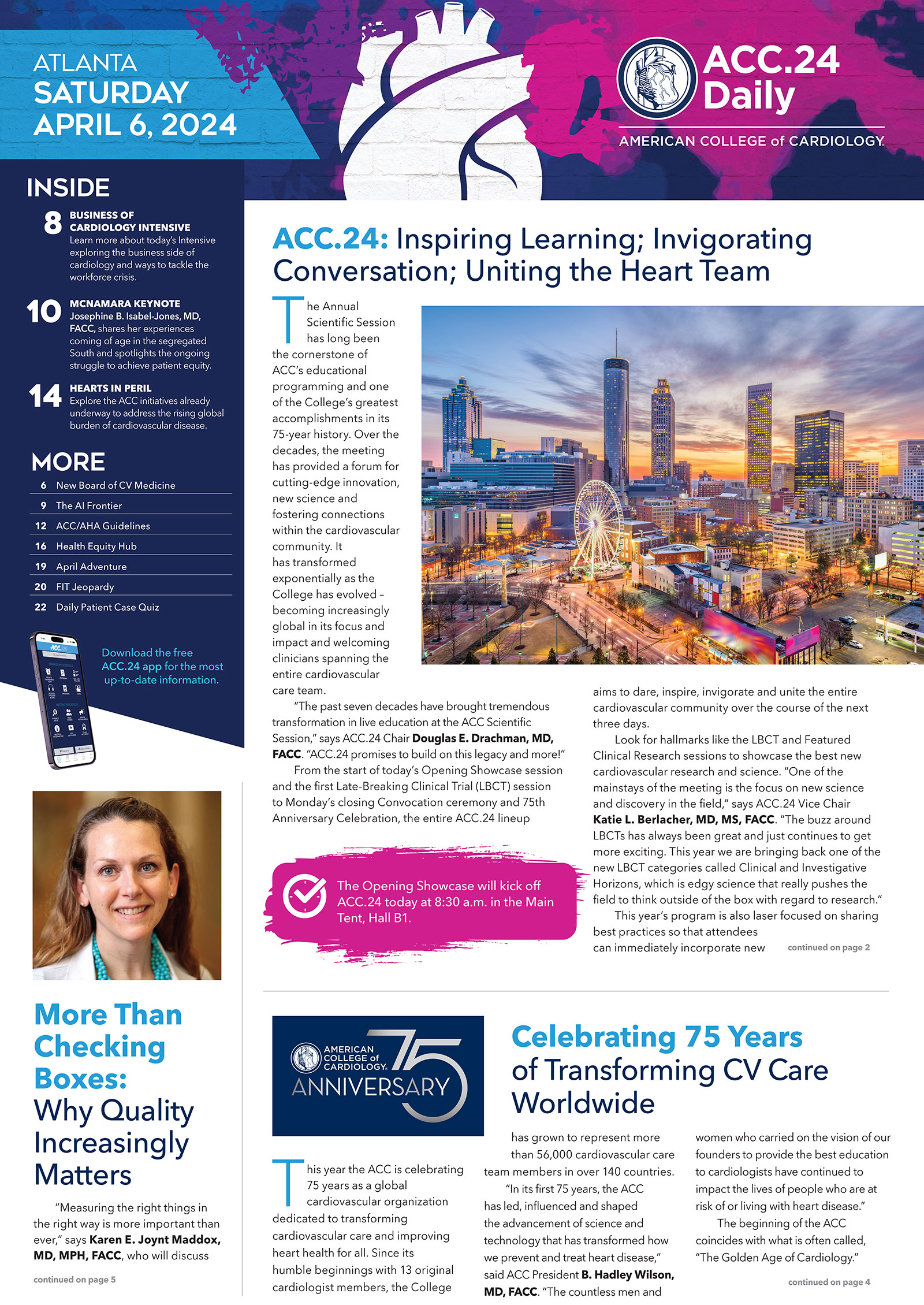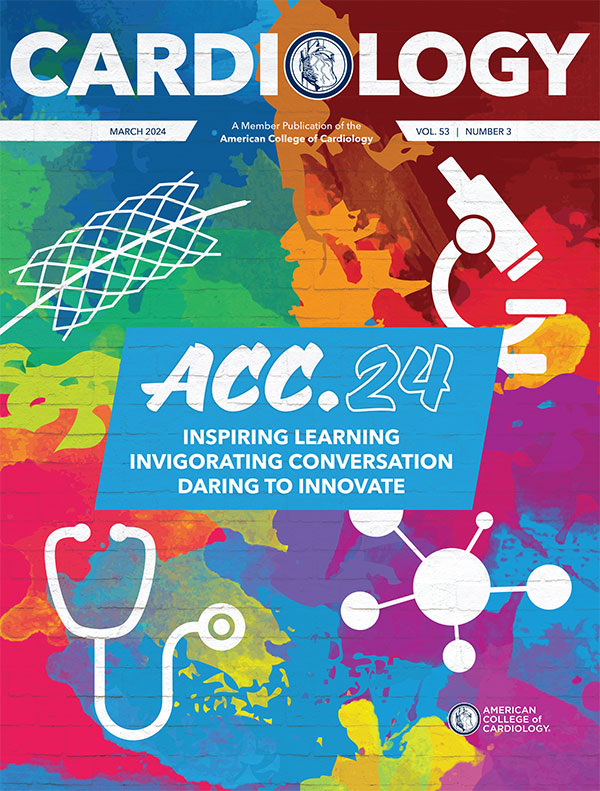ACC.24 Opening Showcase Presidential Address

SEVENTY-FIVE YEARS! Today, we stand at a remarkable milestone, commemorating the founding of the ACC. In 1949 during what is often called the "Golden Age of Cardiology," 13 pioneering cardiologists led by Dr. Franz Groedel and Dr. Bruno Kisch met in New York City and laid the foundation for a professional home for cardiovascular clinicians seeking the latest science, cutting-edge research, and transformative education.
Reflecting on these 75 years, we recognize the visionary men and women, who have dedicated themselves to patient-centered care and to achieving the Mission of the College. Individuals like Susan Knoebel our first woman president, Andreas Gruentzig the father of angioplasty, health equity pioneer Richard Allan Williams, our own Olympic Torch-running president William Zoghbi, TAVR pioneer Allen Cribier, Kim Allen Williams our first African American President, and of course Eugene Braunwald, Valentin Fuster and so many others. We could be here all day!
The unwavering commitment of all of these individuals to science, knowledge and innovation have yielded groundbreaking advancements in cardiovascular care. Not to mention, their dedication and leadership to the ACC have made the College the global cardiovascular leader it is today.
Major highlights over the last seven decades include:
The growth and expansion of our Membership to encompass more than 56,000 clinicians from across the cardiovascular care team and more than 140 countries around the world.
The debut of our first live education meeting in New York in 1957, to the subsequent evolution of this very meeting today. Today, the College hosts roughly 12 educational events each year, including three successful regional conferences in Asia, the Middle East and Latin America. We have definitely come a long way since ACC President Eliot Corday received federal funding for the first international circuit course in Taiwan and the Philippines back in 1961!
The continued dissemination of scientific knowledge through our world-renowned JACC Journals – now numbering 10! Ever since the first issue of JACC was published in 1981 under Dr. Simon Dack, the JACC Journals family has grown to be an integral part of the College's commitment to excellence and a catalyst for the dissemination and discussion of the latest science and the trusted source in cardiovascular medicine.
The global expansion of our Chapter systems to include 48 domestic State Chapters and 42 International Chapters. The current Chapter system started in 1986 with the formation of the ACC Florida Chapter, led at the time by Dr. Carl Pepine, who is here with us today. We have come a long way thanks to the vision and leadership of Dr. Pepine – who is here with us today – and others like him who have served on our Board of Governors and International Assembly of Governors, respectively.
The creation and evolution of our unique Member Sections tied to various clinical interests, career stages and roles within the CV Team. These robust global communities, the first of which debuted in 2005, provide important opportunities for leadership growth, mentoring and so much more.
Our pivotal partnership with the American Heart Association to develop clinical guidelines that started 40 years ago is still going strong. It's hard to believe that our first guideline on pacemaker implantation debuted in 1984. Meanwhile our most recent guideline on atrial fibrillation is the subject of a number of guideline-related sessions over the next three days. We have also added Expert Consensus Decision Pathways, Appropriate Use Criteria and Heart House Roundtables to our clinical guidance toolbox.
And importantly our NCDR registries, and more recently ACC Accreditation Services, have empowered over 2,000 hospitals, health systems and other facilities to harness the power of data for evidence-based care for more than 25 years.
As the ACC grew, it became clear that to truly advance solutions to heart health, the College would have to influence health policy and so in 1965 the ACC moved its headquarters from New York to Bethesda, MD, to be closer to the National Institutes of Health. The College moved a third time in 2006 to its current headquarters in Washington, DC, to be even closer to Nation's Capital and the halls of Congress where health policies are made.
I'd be remiss if I left out the COVID pandemic – a global pandemic that changed all of our lives forever. The College was able to pivot in a manner of weeks to create a completely virtual ACC.20 and rallied, working closely with society and industry partners, to provide members on the front lines around the world with the latest clinical guidance, best practices and resources.
It is truly awe-inspiring to witness how the landscape of cardiology has transformed into its own distinct specialty. From open-heart surgery to drug-eluting stents, genomics to telemedicine, the evolution of cardiovascular care has been one of constant progress.
The ACC, too, has evolved into a global leader, uniting around the collective Mission to transform cardiovascular care and improve heart health for all. Through collaboration and determination, the College has consistently remained at the forefront of change by proactively focusing on transforming care delivery, delivering actionable knowledge, ensuring organizational sustainability and being the professional home for the entire cardiovascular care team.
Through it all, we have been steadfast in our commitment to enhancing membership value and engagement among all of our members, including international cardiovascular professionals, Fellows in Training, program directors, practice administrators and early career professionals. Impactful initiatives, such as the Sandra J. Lewis Mid-Career Women's Leadership Development Program, the ACC Leadership Academy, the Emerging Faculty Program, and the Clinical Trial Research Program, have focused on identifying new ways to diversify and cultivate new and emerging leaders.
Understanding the evolving needs of the "Member of the Future" has also been central to the College's "professional home" efforts. Initiatives like the Internal Medicine Cardiology Program, Young Scholars, Hani Najm Global Scholar Award, and the William A. Zoghbi International Research Award are a means of growing and sustaining the membership pipeline. We are lucky to have representatives from our IM programs and Young Scholars here with this morning!
This year, alongside our 75th Anniversary, we embark on the next chapter, launching our next five-year Strategic Plan.
We will be focused on five major initiatives that include addressing health equity and developing actionable tools to address disparities, increasing awareness, and embedding health equity into education and training.
We will also be assessing our educational portfolio to ensure more personalized and interactive experiences. New digital technologies and platforms are revolutionizing education. Initiatives like our NCD Academy and new ACC Anywhere video library, as well as internal digital transformation improvements are making it easier to provide the education you need, when you need it!
A transformative shift to sustaining professional excellence through continuous cardiovascular clinical competence is also on our dashboard. We are excited and optimistic about our collaborative efforts with the AHA, HRS, HFSA and SCAI to create a new, independent Board of Cardiovascular Medicine. Our application for this new Board has been submitted to the American Board of Medical Specialties and we hope to have a positive response later this year.
Enabling Guidance at the Point of Care and care transformation are the other major focal points of the next five years. In both cases, collaborations with partner societies, MedAxiom, health systems and other stakeholders around innovative solutions will be key to driving improved patient outcomes, putting actionable knowledge literally at your fingertips; and defining best practices in cardiovascular care.
As we look to the future, big data, wearables, remote patient monitoring, digital health, large language models, and AI will all contribute to this Care Transformation.
The ACC Innovation Program led by Chief Innovation Officer Dr. Ami Bhatt is hard at work identifying how best to leverage these innovations to aid clinicians in caring for the growing global burden of CV Disease and enabling equitable high quality cardiovascular care in the communities where people live.
Already, clinical trials testing gene-editing technologies to address genetic factors contributing to cardiovascular diseases and AI-driven algorithms are being piloted to provide more precise and rapid diagnosis, along with personalized treatment plans. And, according to Forbes, we can expect AI algorithm implementation to save upwards of $150 Billion in the next 3 to 5 years.
However, it's important that we do not surrender our responsibility for verifying the data that is generated and ensuring fair interpretation of its outputs with the intention of together becoming more intelligent.
What will the Hospital of the Future look like? Ambient sensors, AI, and NLP? Video platforms and AI-powered robots? Seamless automatic creation of visit notes to EHR? Smaller, more portable medical equipment? One room from admission to surgery to discharge? AI-facilitated connectivity that directs movement through the system to earlier home-based care and beyond? The possibilities are endless and the ACC will be with you on this journey!
In closing, let us continue on this elevated digital highway together, realizing our full potential and ensuring a legacy that extends for another 75 years and beyond. ACC's story is one of resilience, innovation and collective dedication. Always aligned with our core values of patient-centered care, teamwork and collaboration, professionalism, excellence and equity.
Thank you for being here today and along this remarkable journey with us. Here's to another 75 years. Let's get started!
Keywords: ACC Publications, ACC Scientific Session Newspaper, ACC24, ACC History


